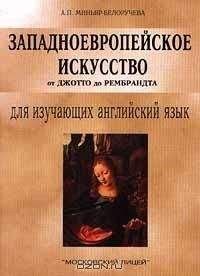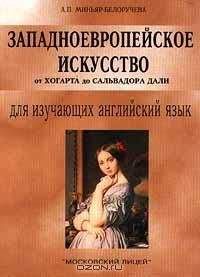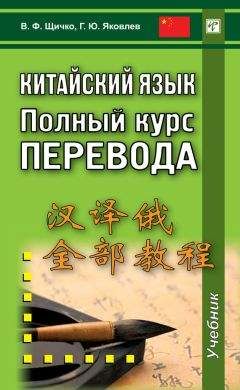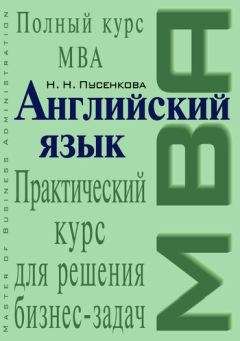Илья Франк - Английский язык с Грэмом Грином. Третий человек
"I can't give you a drink here (я здесь не могу дать вам выпить: «напиток»). Except tea (кроме чая). There's some of that packet left (немного осталось из того пакета)."
"No, no thank you (нет, нет, спасибо)." He said, "You are busy (вы заняты)," looking at the script (поглядев на сценарий).
"I didn't get beyond the first line (я не добралась дальше первой строчки)."
He picked it up and read (он поднял его /сценарий/ и прочитал): "Enter Louise (входит Луиза). Louise: I heard a child crying (я слышала плачущего ребенка)."
"Can I stay a little (могу я остаться немного)?" he asked with a gentleness that was more Martins than Rollo (спросил он с мягкостью которая была больше Мартинс, чем Ролло).
"I wish you would (я хотела бы: «желаю», чтобы вы остались)." He slumped down on the divan (он тяжело опустился вниз на тахту; to slump — проваливаться /в болото, трясину/; шлепаться в воду; тяжело, неуклюже двигаться), and he told me a long time later (и он рассказал мне много позже) (for lovers talk and reconstruct the smallest details if they can find a listener (ибо влюбленные говорят и восстанавливают мельчайшие детали, если они могут найти слушателя) that there it was he took his second real look at her (что именно тут он посмотрел на нее второй раз: «взял свой второй настоящий взгляд на нее»). She stood there as awkward as himself (она стояла там такая же неловкая, как он сам) in a pair of old flannel trousers which had been patched badly in the seat (в паре старых фланелевых штанов, которые были заплатаны ужасно = много раз сзади; seat — седалище, зад; задняя часть, зад): she stood with her legs firmly straddled as though she were opposing someone and was determined to hold her ground (она стояла, с ногами прочно поставленными, как будто она противостояла кому-то и была полна решимости настоять на своем: «держать свою землю/территорию»; to straddle — сидеть, стоять или ходить, широко расставляя ноги)—a small rather stocky figure (маленькая, довольно приземистая фигура) with any grace she had folded and put away for use professionally (с какой-либо грацией = и какая бы ни была у нее грация, она /ее/ свернула и положила прочь для профессионального использования = без какой-либо грации, которую она, видимо…).
"One of those bad days (один из плохих = неудачных дней)?" he asked.
"It's always bad about this time (всегда /бывает/ плохо в это время)." She explained (она объяснила): "He used to look in (он часто заглядывал/заходил ко мне), and when I heard your ring, just for a moment, I thought (и когда я услышала ваш звонок, только на мгновение, я подумала)..." She sat down on a hard chair opposite him and said (она села вниз на жесткий стул напротив него и сказала), "Please talk (пожалуйста, говорите). You knew him (вы знали его). Just tell me anything (просто расскажит мне что угодно)."
And so he talked (и он говорил/рассказывал). The sky blackened outside the window while he talked (небо за окном почернело, пока он говорил). He noticed after a while that their hands had met (он заметил после недолгого времени, что их руки встретились). He said to me (он сказал мне), "I never meant to fall in love (я никогда =вовсе не собирался влюбиться: «впасть в любовь»), not with Harry's girl (не в девушку Гарри)."
"When did it happen (когда это случилось)?" I asked him (спросил я его).
"It was very cold and I got up to close the window curtains (было очень холодно, и я встал, чтобы закрыть оконные занавески; to get up — встать). I only noticed my hand was on hers when I took it away (я только тогда заметил, что моя рука была на ее руке, когда я отнял/убрал ее: «взял ее прочь»). As I stood up I looked down at her face (когда я встал, я посмотрел вниз на ее лицо; to stand up — встать) and she was looking up (а она смотрела вверх/подняла взгляд). It wasn't a beautiful face (это не было красивое лицо)—that was the trouble (вот в чем была проблема). It was a face to live with (это было лицо, с которым /можно было/ жить), day in, day out (изо дня в день: «день внутрь, день наружу»). A face for wear (лицо для нóски; to wear — носить /одежду/). I felt as though I'd come into a new country (я почувствовал так, словно я приехал в новую страну) where I couldn't speak the language (где я не мог говорить на языке /этой страны/). I had always thought it was beauty one loved in a woman (я всегда думал, что в женщине любишь/любят именно красоту). I stood there at the curtains, waiting to pull them, looking out (я стоял там у занавесок, ожидая потянуть их, смотря наружу). I couldn't see anything but my own face (я не мог видеть чего-либо, кроме моего собственного лица), looking back into the room (смотрящего назад в комнату), looking for her (ищущего ее; to look for — искать). She said, 'And what did Harry do that time (а что сделал Гарри сделать в тот раз)?' and I wanted to say (и я хотел сказать), 'Damn Harry (к черту Гарри; to damn — проклинать). He's dead (он мертв). We both loved him, but he's dead (мы оба любили его, но он мертв). The dead are made to be forgotten (мертвецы сделаны = предназначены, чтобы быть забытыми = мертвецы на то и мертвецы, чтобы их забывать; to forget — забывать).' Instead of course all I said was (вместо этого, конечно, все, что я сказал, было), What do you think (что вы думаете)? He just whistled his old tune (он просто просвистел свою старую мелодию) as if nothing was the matter (как ни в чем не бывало; matter — вещество; материя; сущность; содержание; тема, вопрос, предмет /обсуждения и т. п./; вопрос, дело),' and I whistled it to her as well as I could (и я просвистел ее ей так хорошо, как я мог). I heard her catch her breath (я услышал, как она затаила дыхание: «я услышал ее поймать дыхание»), and I looked round and before I could think (и я оглянулся, и прежде чем я мог подумать) is this the right way (правильный это путь/способ), the right card (правильная ли карта), the right gambit (правильный ли гамбит)?—I'd already said (я уже сказал), 'He's dead (он мертв). You can't go on remembering him for ever (вы не можете продолжать помнить/вспоминать его всегда/постоянно; for ever — навсегда, навечно; беспрестанно).'"
reply [rI'plaI], busy ['bIzI], divan [dI'vxn], detail ['di:teIl], trousers ['trauzqz], oppose [q'pquz], determin [dI'tq:mIn]
"Passing? Where to?" It had been a good half an hour's walk from the Inner City to the rim of the English zone, but he always had a reply. "I had too much whisky with Cooler. I needed a walk and I just happened to find myself this way."
"I can't give you a drink here. Except tea. There's some of that packet left."
"No, no thank you." He said, "You are busy," looking at the script.
"I didn't get beyond the first line."
He picked if up and read: "Enter Louise. Louise: I heard a child crying."
"Can I stay a little?" he asked with a gentleness that was more Martins than Rollo.
"I wish you would." He slumped down on the divan, and he told me a long time later (for lovers talk and reconstruct the smallest details if they can find a listener) that there it was he took his second real look at her. She stood there as awkward as himself in a pair of old flannel trousers which had been patched badly in the seat: she stood with her legs firmly straddled as though she were opposing someone and was determined to hold her ground—a small rather stocky figure with any grace she had folded and put away for use professionally.
"One of those bad days?" he asked.
"It's always bad about this time." She explained: "He used to look in, and when I heard your ring, just for a moment, I thought ..." She sat down on a hard chair opposite him and said, "Please talk. You knew him. Just tell me anything."
And so he talked. The sky blackened outside the window while he talked. He noticed after a while that their hands had met. He said to me, "I never meant to fall in love, not with Harry's girl."
"When did it happen?" I asked him.
"It was very cold and I got up to close the window curtains. I only noticed my hand was on hers when I took it away. As I stood up I looked down at her face and she was looking up. It wasn't a beautiful face—that was the trouble. It was a face to live with, day in, day out. A face for wear. I felt as though I'd come into a new country where I couldn't speak the language. I had always thought it was beauty one loved in a woman. I stood there at the curtains, waiting to pull them, looking out. I couldn't see anything but my own face, looking back into the room, looking for her. She said, 'And what did Harry do that time?' and I wanted to say, 'Damn Harry. He's dead. We both loved him, but he's dead. The dead are made to be forgotten.' Instead of course all I said was, What do you think? He just whistled his old tune as if nothing was the matter,' and I whistled it to her as well as I could. I heard her catch her breath, and I looked round and before I could think is this the right way, the right card, the right gambit?—I'd already said, 'He's dead. You can't go on remembering him for ever.'"
She said, "I know (я знаю), but perhaps something will happen first (но, возможно, что-то случится прежде)."
"What do you mean (что вы имеете в виду)—something happen (что-то может случиться)?"
"Oh, I mean (о, я имею в виду), perhaps there'll be another way (возможно, будет другой путь), or I’ll die (или я умру), or something (или что-то /еще/)."
"You'll forget him in time (вы забудете его cо временем). You'll fall in love again (вы полюбите снова)."
"I know, but I don't want to (я знаю, но я не хочу). Don't you see I don't want to (разве вы не видите, что я не хочу)."
So Rollo Martins came back from the window (так что Ролло Мартинс отошел от окна) and sat down on the divan again (и снова сел на тахту). When he had risen half a minute before (когда он поднимался за полминуты до этого; to rise — вставать, подниматься) he had been the friend of Harry comforting Harry's girl (он был другом Гарри, утешающим девушку Гарри): now he was a man in love with Anna Schmidt (теперь он был мужчиной, влюбленным в Анну Шмидт) who had been in love with a man (которая /раньше/ была влюблена в человека) they had both once known called Harry Lime (которого они оба когда-то знали, по имени Гарри Лайм). He didn't speak again that evening about the past (он не говорил снова тем вечером о прошлом). Instead he began to tell her of the people he had seen (вместо этого он начал рассказывать ей о людях, которых он повидал = с которыми он повстречался). "I can believe anything of Winkler (я могу поверить чему угодно о Винклере)," he told her (сказал он ей), "but Cooler—I liked Cooler (но Кулер — мне понравился Кулер). He was the only one of his friends (он был единственным из его друзей) who stood up for Harry (который защищал Гарри).The trouble is (проблема в том) , if Cooler's right (если Кулер прав), then Koch is wrong (тогда неправ Кох), and I really thought I had something there (а я действительно думал, что я что-то узнал там)."
"Who's Koch (кто такой Кох)?"
He explained how he had returned to Harry's flat (он объяснил, как он вернулся в квартиру Гарри) and he described his interview with Koch (и описал свою беседу с Кохом), the story of the third man (историю третьего человека).
"If it's true (если это правда)," she said, "it's very important (/то/ это очень важно)."
"It doesn't prove anything (это не доказывает чего-либо). After all (в конце концов: «после всего»), Koch backed out of the inquest (Кох вышел: «отступил назад» из расследования), so might this stranger (так мог /сделать и/ этот незнакомец)."
"That's not the point (это не есть /главный/ смысл = не в этом дело)," she said. "It means that they lied (это значит ,что они лгали). Kurtz and Cooler (Куртц и Кулер)."




